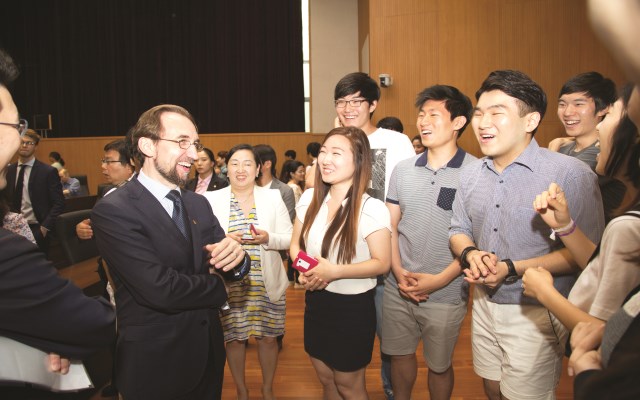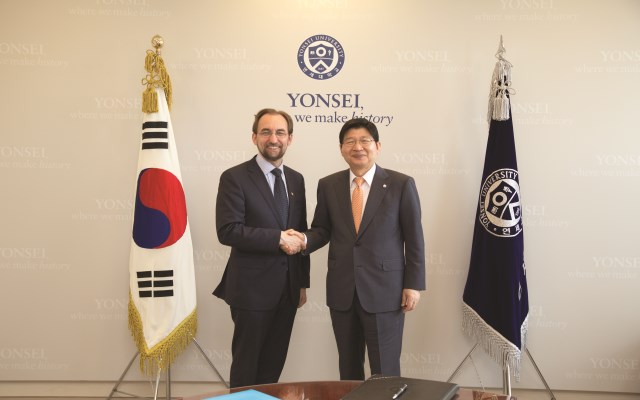Yonsei News
-
[YONSEI NEWS] Prince Zeid Ra’ad Al Hussein, UN High Commissioner for Human Rights, Delivers Special Leadership Lecture at Yonsei
연세대학교 홍보팀 / news@yonsei.ac.kr2015-08-19 -
Prince Zeid Ra’ad Al Hussein, UN High Commissioner for Human Rights, Delivers Special Leadership Lecture at Yonsei
-Focus on “Korea in the Human Rights World”

On June 24, United Nations High Commissioner for Human Rights Prince Zeid Ra’ad Al Hussein spoke on “Korea in the Human Rights World” for the 96th Leadership Special Lecture. Prince Zeid was invited to Yonsei by the Leadership Center of the Institute of East and West Studies, the Human Liberty Center of the Graduate School of International Studies, and the Yonsei Law School. Prince Zeid was named UN High Commissioner for Human Rights on September 1, 2014; he is the seventh person to head the Office of the High Commissioner for Human Rights (OHCHR) and the first from Asia.
Prince Zeid began his talk by emphasizing the importance of global leadership. “Our world cries out for better global leadership,” he said, elaborating: “Leadership which is sensitive to the experiences and needs of people, and which acknowledges that the principles of human rights build societies that are more stable, more peaceful, more welcoming, and more prosperous. Leadership which understands that where there are differences among us, these should be resolved through dialogue, cooperation, mutual respect, and reconciliation.”
Highlighting the relationship between human rights and history, Prince Zeid stressed that “if the needs of victims and their families are not addressed as a central priority, reconciliation will never occur, and the state of deep distrust, though partially buried, will continue to smolder.” He then spoke of the so-called “comfort women,” young Korean women who were forced into sexual slavery by the Japanese military during World War II: “This morning I met with three extraordinarily brave victims of sexual slavery, euphemistically called comfort women. Like all the victims of war, in the past or the present, and irrespective of location, what they need most from us is not more formal statements or proclamations. Neither do they need others to claim their victimhood, and abuse it for political motives. What they need are gestures of acknowledgment and heartfelt atonement.”
Prince Zeid next turned to Korea’s activities in the UN Human Rights Council and the UN Security Council, praising the leadership of UN Secretary-General Ban Ki-moon and applauding Korea’s “remarkable work on the global human rights scene.” He lamented, however, “that similar efforts cannot be made at the regional level [of East Asia], for lack of strong institutions.” Expressing his dismay at the poor human rights record of the North Korean regime, Prince Zeid described the country as “almost an exact inverse image of the Republic of Korea’s successes,” noting that “people starve for lack of resources and because of deliberate official actions, are murdered for whispered dissent, and may be subjected to enslavement, torture, forcible transfers, and persecution.” To address these human rights issues in North Korea, he explained that the UN is pursuing a “two track” approach, which combines “strong efforts for accountability with engagement, and offers of international assistance for change.” He added that the OHCHR’s new Seoul Field Office, which opened June 23, “will be a strong platform for monitoring, reporting and engagement—a hub for all stakeholders interested in promoting human rights improvements in the DPRK.”

During the question and answer session, Prince Zeid fielded a number of questions concerning human rights issues in North Korea, including the forced repatriation of defectors by China and the negative impact UN human rights investigations may have for North Korean citizens. He acknowledged that these are very difficult and sensitive issues, but emphasized that the OHCHR “stands for the rights of the victims, victims who have endured cruelty of such magnitude and duration that they almost defy human understanding, and who have an indisputable right to justice. By involving regional actors in a common search to end impunity in the DPRK, it is our hope that we can encourage much broader understanding of accountability and justice among key partners.”
- vol. All
- vol. 1243
- vol. 1122
- vol. 125
- vol. 124
- vol. 123
- vol. 122
- vol. 121
- vol. 120
- vol. 119
- vol. 118
- vol. 117
- vol. 116
- vol. 115
- vol. 114
- vol. 113
- vol. 112
- vol. 111
- vol. 110
- vol. 109
- vol. 108
- vol. 107
- vol. 106
- vol. 105
- vol. 104
- vol. 103
- vol. 102
- vol. 101
- vol. 100
- vol. 99
- vol. 98
- vol. 97
- vol. 96
- vol. 95
- vol. 94
- vol. 93
- vol. 92
- vol. 91
- vol. 90
- vol. 89
- vol. 88
- vol. 87
- vol. 86
- vol. 85
- vol. 84
- vol. 83
- vol. 82
- vol. 81
- vol. 80
- vol. 79
- vol. 78
- vol. 77
- vol. 76
- vol. 75
- vol. 74
- vol. 73
- vol. 72
- vol. 71
- vol. 70
- vol. 69
- vol. 68
- vol. 67
- vol. 66
- vol. 65
- vol. 64
- vol. 63
- vol. 62
- vol. 61
- vol. 60
- vol. 59
- vol. 58
- vol. 57
- vol. 56
- vol. 55
- vol. 54
- vol. 53
- vol. 52
- vol. 51
- vol. 50
- vol. 49
- vol. 48
- vol. 47
- vol. 46
- vol. 45
- vol. 44
- vol. 43
- vol. 42
- vol. 41
- vol. 40
- vol. 39
- vol. 38
- vol. 37
- vol. 36
- vol. 35
- vol. 34
- vol. 33
- vol. 32
- vol. 31
- vol. 30
- vol. 29
- vol. 28
- vol. 27
- vol. 26
- vol. 25
- vol. 24
- vol. 23
- vol. 22
- vol. 21
- vol. 20
- vol. 19
- vol. 18
- vol. 17
- vol. 16
- vol. 15
- vol. 14
- vol. 13
- vol. 12
- vol. 11
- vol. 10
- vol. 9
- vol. 8
- vol. 7
- vol. 6
- vol. 5
- vol. 4
- vol. 3
- vol. 2
- vol. 1